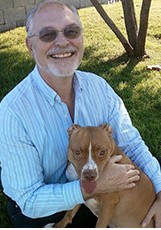Veterinarian Overview
Dr. Brinkmann is originally from Kentucky and graduated from the University of Kentucky with a Bachelor in Science degree in Animal Sciences. He attended Auburn University College of Veterinary Medicine where he received his Doctorate of Veterinary Medicine degree. He moved to Las Vegas in 1979 and practiced for 3 years at Paradise Pet Hospital before establishing Animal Medical Hospital at the current site of Veterinary Ophthalmology Service. After 11 years of general practice Dr. Brinkmann returned to school to complete his residency in Ophthalmology at North Carolina State University College of Veterinary Medicine. He returned to Las Vegas and started Veterinary Ophthalmology Service in 1992 fulfilling the need for a full-time Board Certified Veterinary Ophthalmologist in the Las Vegas valley. Now in his 21st year in specialty practice, Dr. Brinkmann's interest is to continue to provide an advanced state-of-the-art ophthalmology service for his patients, their owners and his veterinary colleagues in the greater Las Vegas area. What does it mean to be a 'Board Certified member and Diplomate' of the American College of Veterinary Ophthalmologists? Many people are amazed that they have been referred to a veterinary ophthalmologist. Many years of training are required to become board-certified in veterinary ophthalmology. In addition to the typical 8 years of college required to become a veterinarian, a veterinary ophthalmologist will then complete at least 4 years of additional training, including a one-year internship in general medicine and surgery, plus a three-year residency in an ACV0-approved ophthalmology residency. After completion of their residency, the veterinarian must then pass a rigorous, four-day, written and practical certifying examination in order to become board-certified and receive Diplomate status in the American College of Veterinary Ophthalmologists. Becoming a Diplomate in a specialty college is the highest standard a veterinarian can accomplish and indicates dedication to their area of specialization. A veterinarian can not legally call him or herself a specialist in any field unless they are board certified in a specialty recognized by the American Veterinary Medical Association, AVMA. The process to become board certified in ophthalmology is selective as there are only 28 veterinary schools in the country and many of them do not have an ophthalmologist much less a residency training program. Quality control of the residency training programs is the responsibility of the ACVO. Each training program may only take a resident every 2-3 years depending on the number of residency positions available. At the writing of this web site there are approximately 300 board certified veterinary ophthalmologists in our country. To learn more about the ACVO, visit their web site at www.acvo.org or click below. American College of Veterinary Ophthalmologists








